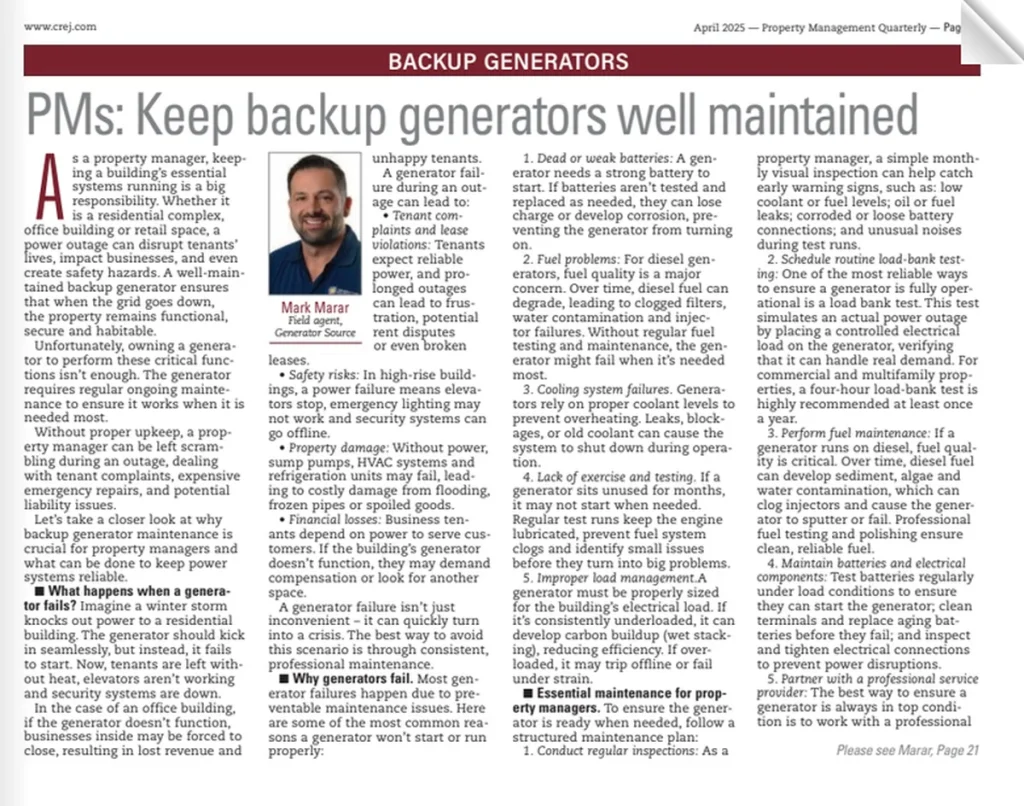Key Takeaways
by: Mark Marar | Colorado Field Services Manager
appears in: The Colorado Real Estate Jounal – April, 2025 Edition
Backup generators are essential for property managers, but without regular maintenance they can quickly fail when needed most, leading to tenant complaints, safety risks, property damage, and financial losses. The most common causes of failure — weak batteries, degraded fuel, cooling issues, lack of testing, and improper load management — are all preventable. A structured maintenance program that includes inspections, load bank testing, fuel treatment, battery care, and professional service contracts ensures reliability, compliance, and tenant confidence. Proactive maintenance ultimately saves time, money, and protects both property and reputation.
- Why It Matters: A failed generator during an outage creates tenant dissatisfaction, safety hazards, property damage, and lost revenue.
- Common Failure Causes:
- Dead/weak batteries
- Fuel degradation/contamination
- Cooling system problems
- Lack of routine testing
- Improper load sizing/management
- Essential Maintenance Steps:
- Monthly visual inspections for leaks, low fluids, corrosion, or unusual noises
- Annual load bank testing (4-hour minimum for commercial/multifamily)
- Regular fuel testing and polishing for diesel systems
- Battery load testing, cleaning, and timely replacement
- Professional service contracts for scheduled oil changes, coolant flushes, and regulatory compliance
- Bottom Line: Proactive maintenance keeps generators reliable, reduces liability, and ensures uninterrupted operations for tenants.

As a property manager, keeping a building’s essential systems running is a big responsibility. Whether it is a residential complex, office building, or retail space, a power outage can disrupt tenants’ lives, impact businesses, and even create safety hazards. A well-maintained backup generator ensures that when the grid goes down, the property remains functional, secure, and habitable.
Unfortunately, owning a generator to perform these critical functions isn’t enough. The generator requires regular ongoing maintenance to ensure it works when it is needed most.
Without proper upkeep, a property manager can be left scrambling during an outage, dealing with tenant complaints, expensive emergency repairs, and potential liability issues.
Let’s take a closer look at why backup generator maintenance is crucial for property managers and what can be done to keep power systems reliable.
What Happens When a Generator Fails?
Imagine a winter storm knocks out power to a residential building. The generator should kick in seamlessly, but instead, it fails to start. Now, tenants are left without heat, elevators aren’t working, and security systems are down.
In the case of an office building, if the generator doesn’t function, businesses inside may be forced to close, resulting in lost revenue and unhappy tenants.
A generator failure during an outage can lead to:
- Tenant complaints and lease violations – Tenants expect reliable power, and prolonged outages can lead to frustration, potential rent disputes, or even broken leases.
- Safety risks – In high-rise buildings, a power failure means elevators stop, emergency lighting may not work, and security systems can go offline.
- Property damage – Without power, sump pumps, HVAC systems, and refrigeration units may fail, leading to costly damage from flooding, frozen pipes, or spoiled goods.
- Financial losses – Business tenants depend on power to serve customers. If the building’s generator doesn’t function, they may demand compensation or look for another space.
A generator failure isn’t just inconvenient—it can quickly turn into a crisis. The best way to avoid this scenario is through consistent, professional maintenance.
Why Generators Fail
Most generator failures happen due to preventable maintenance issues. Here are some of the most common reasons a generator won’t start or run properly:
1. Dead or Weak Batteries
A generator needs a strong battery to start. If batteries aren’t tested and replaced as needed, they can lose charge or develop corrosion, preventing the generator from turning on.
2. Fuel Problems
For diesel generators, fuel quality is a major concern. Over time, diesel fuel can degrade, leading to clogged filters, water contamination, and injector failures. Without regular fuel testing and maintenance, the generator might fail when it’s needed most.
3. Cooling System Failures
Generators rely on proper coolant levels to prevent overheating. Leaks, blockages, or old coolant can cause the system to shut down during operation.
4. Lack of Exercise and Testing
If a generator sits unused for months, it may not start when needed. Regular test runs keep the engine lubricated, prevent fuel system clogs, and identify small issues before they turn into big problems.
5. Improper Load Management
A generator must be properly sized for the building’s electrical load. If it’s consistently underloaded, it can develop carbon buildup (wet stacking), reducing efficiency. If overloaded, it may trip offline or fail under strain.
Essential Maintenance for Property Managers
To ensure the generator is ready when needed, follow a structured maintenance plan.
1. Conduct Regular Inspections
As a property manager, a simple monthly visual inspection can help catch early warning signs, such as:
• Low coolant or fuel levels
• Oil or fuel leaks
• Corroded or loose battery connections
• Unusual noises during test runs
2. Schedule Routine Load Bank Testing
One of the most reliable ways to ensure a generator is fully operational is a load bank test. This test simulates an actual power outage by placing a controlled electrical load on the generator, verifying that it can handle real demand. For commercial and multifamily properties, a 4-hour load bank test is highly recommended at least once a year.
3. Perform Fuel Maintenance
If a generator runs on diesel, fuel quality is critical. Over time, diesel fuel can develop sediment, algae, and water contamination, which can clog injectors and cause the generator to sputter or fail. Professional fuel testing and polishing ensure clean, reliable fuel.
4. Maintain Batteries and Electrical Components
• Test batteries regularly under load conditions to ensure they can start the generator.
• Clean terminals and replace aging batteries before they fail.
• Inspect and tighten electrical connections to prevent power disruptions.
5. Partner with a Professional Service Provider
The best way to ensure a generator is always in top condition is to work with a professional maintenance team. A quarterly or semi-annual service contract can help:
• Keep up with oil changes and coolant flushes
• Identify and repair small issues before they lead to failure
• Ensure compliance with local regulations and insurance requirements
The Bottom Line: Proactive Maintenance Saves Time and Money
A property manager’s job is to ensure tenant comfort and safety. A well-maintained backup generator is one of the most valuable assets in achieving these goals.
By investing in routine inspections, scheduled load testing, and professional maintenance, unexpected failures can be avoided, tenant disruptions are minimized, and the property is protected from potentially costly damage.
Don’t wait for an outage to discover that the generator isn’t running. A well-maintained generator isn’t just a backup plan—it’s a guarantee of reliability.
